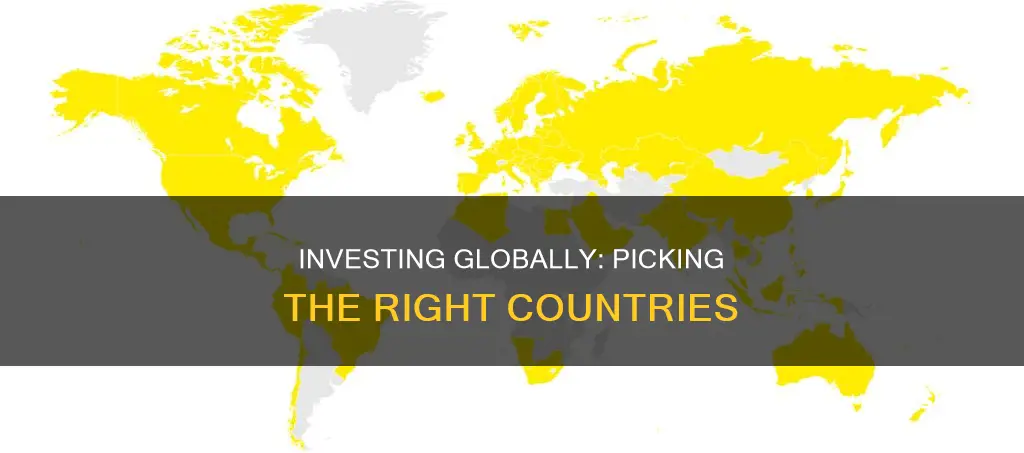
Investing in foreign markets is a great way to diversify your portfolio and take advantage of growth in other economies. However, it is important to be aware of the potential risks, such as currency fluctuations, tax implications, regulatory differences, and the possibility of fraud or manipulation in less regulated markets.
When considering which countries to invest in, it is crucial to take into account factors such as economic stability, political climate, growth potential, and business-friendly policies. Some of the top countries for investment worldwide include the United States, Singapore, China, Canada, the United Arab Emirates, Thailand, and India. These countries offer a range of investment opportunities across various sectors and have strong economic and political foundations that support business growth and foreign investment.
There are several ways to invest in international markets, including foreign direct investing, American and Global Depository Receipts (ADRs and GDRs), mutual funds, exchange-traded funds (ETFs), and multinational corporations (MNCs). Each method has its own advantages and considerations, so it is important to carefully evaluate your options before making any investment decisions.
| Characteristics | Values |
|---|---|
| Economic stability | Low unemployment, high GDP per capita, low inflation, strong financial system, large foreign exchange reserves, low public debt |
| Political climate | Stable, democratic system of government, strong government policies, low corruption, strong focus on economic development, investor-friendly policies |
| Growth potential | Large market, growing economy, favourable policies, diverse economy, strong export industries, increasing consumption, skilled workforce |
| Business environment | Business-friendly, favourable tax environment, low taxes, streamlined regulations, protection of intellectual property rights, transparency |
| Other | Strong manufacturing and technology sectors, natural resources, renewable energy, tourism |
What You'll Learn

Understand the economic and political landscape of the country
Understanding the economic and political landscape of a country is crucial before investing. Here are some factors to consider:
Economic Factors
- Debt repayment ability: Assess the country's ability to pay back its debts. A country with stable finances and a stronger economy should provide more reliable investments than a country with weaker finances or an unsound economy.
- Economic growth and stability: Consider the country's economic growth rate and stability. Developed markets, such as the US, Canada, and France, often have slower economic growth but are considered safer investment destinations due to their well-developed economic systems and political stability.
- Financial fundamentals: Evaluate the country's financial fundamentals, such as gross domestic product (GDP), inflation, and consumer price index (CPI) readings.
- Market classification: Countries are typically classified into three levels of development: frontier, emerging, and developed markets. Frontier markets, like Nigeria, Botswana, and Kuwait, are the riskiest but offer the potential for above-average returns. Emerging markets, like China, India, and Brazil, have high economic growth rates but also higher political uncertainty and economic volatility. Developed markets, on the other hand, have slower economic growth but are more stable and less risky.
- Investment options: Look at the country's investment landscape. Are there attractive investment alternatives available? What is the performance of the local stock and bond markets?
Political Factors
- Political stability: Understand the political landscape of the country. Has the country achieved political stability? How long do governments typically last, and how strong is the regime? A stable political environment reduces the risk of unexpected policy changes that could impact your investment.
- Government policies: Evaluate the government's policies towards foreign investment. Are they investor-friendly? Do they provide incentives and rebates to foreign investors? Are there any restrictions on foreign ownership of companies or stakes in domestic companies?
- Legal framework: Understand the legal framework governing foreign investment. Are there any regulations or restrictions that could impact your investment? Are there any tax implications or reporting requirements, such as disclosing foreign assets or bank accounts?
Who Manages Your Money?
You may want to see also

Research rules, regulations, and tax implications
Before investing in a foreign country, it is imperative to research the rules and regulations that apply to your situation. This is because the tax implications and regulatory differences can be challenging to navigate. Here are some key considerations:
- Taxes: When investing in foreign companies, you may be subject to taxes on income or capital gains in both your home country and the country where you invest. For US citizens, the IRS will be waiting to take its bite of any money made overseas, in addition to any taxes levied by the company's home country. Understanding the tax laws of the country you are investing in is crucial to maximising your earnings.
- Reporting requirements: You may also need to comply with reporting requirements, such as disclosing your foreign assets or bank accounts. This is an important aspect of maintaining compliance with the regulations of both your home country and the country in which you are investing.
- Consulting professionals: Due to the complexity of international investments, it is highly recommended to consult qualified professionals such as tax advisors or financial planners. They can help you navigate the legal and financial implications of your investments and ensure compliance with the relevant regulations.
- Currency fluctuations: Another factor to consider is the currency exchange rate. The value of your investment and any dividends or interest received can be affected by fluctuations in currency exchange rates. Understanding the risks and benefits of holding investments in different currencies is essential for managing your portfolio effectively.
- Regulatory differences: Each country has its own unique set of regulations and rules that govern foreign investment. These regulations can vary significantly and may include restrictions on foreign ownership in certain sectors or requirements for government approval. It is crucial to understand the regulatory landscape of the country you are investing in to avoid any legal or compliance issues.
China's Bubble: Global Investment Risk
You may want to see also

Diversify your portfolio
Diversifying your portfolio is a crucial aspect of investing in different countries. By spreading your investments across various countries and industries, you can reduce the risk associated with putting all your eggs in one basket. Here are some tips to help you diversify your portfolio effectively:
- Understand your risk tolerance and investment goals: Diversification should be balanced with your risk tolerance and investment objectives. Don't invest in a country just because it has high growth potential or a low valuation. Ensure that it aligns with your overall strategy and goals.
- Allocate an appropriate percentage of your portfolio to foreign stocks: Financial advisors typically recommend a 5% to 10% allocation of foreign stocks for conservative investors and up to 25% for aggressive investors.
- Consider different types of investments: There are various ways to invest in international markets, such as American Depository Receipts (ADRs), Global Depository Receipts (GDRs), foreign direct investing, mutual funds, exchange-traded funds (ETFs), and multinational corporations (MNCs). Each has its own advantages and risk profile.
- Utilize online platforms: Online investment platforms offer global market access, real-time data, research tools, seamless currency conversion, and remote monitoring, making it easier to manage your investments across different countries.
- Monitor and adjust your portfolio regularly: Keep a close eye on market conditions and your personal circumstances, and be prepared to adjust your portfolio accordingly. Regular reviews are essential to staying on top of global shifts and ensuring your investments remain aligned with your goals.
- Seek professional advice: Investing in different countries can be complex due to varying tax systems, regulations, and currencies. Consider consulting tax advisors, financial planners, legal advisors, or portfolio managers with experience in international investments.
- Research and due diligence: Before investing in a foreign country, thoroughly research the rules, regulations, and economic and political conditions of that country. Understand the potential tax implications, reporting requirements, and currency exchange rate risks.
ESG Investors: Why the Lack of Interest in SRI?
You may want to see also

Consider the currency exchange rate
When investing in a foreign country, it is important to consider the currency exchange rate. The exchange rate is the value of a nation's currency when traded for another currency. Exchange rates can be floating, meaning they change based on supply and demand, or they can be fixed to another currency or basket of currencies.
A floating exchange rate is determined by the open market through supply and demand on global currency markets. If demand for a currency is high, the value will increase, and if demand is low, the value will decrease. A floating exchange rate is the most common type and allows a country's currency to fluctuate based on market forces.
On the other hand, a fixed exchange rate is determined by a government through its central bank. The rate is set against a major world currency, and the government will buy and sell its currency to maintain the desired rate. Some countries may choose a fixed exchange rate to create stability in the value of their currency, especially in emerging markets.
As an investor, it is important to understand how exchange rates can impact your investments. For example, if you are a US investor, knowing the dollar-to-euro exchange rate is valuable when selecting European investments. A declining US dollar could increase the value of your foreign investments, while an increasing dollar value could hurt them.
Additionally, currency exchange rates can impact the cost of supplies and finished products purchased from another country, affecting businesses. It can also influence the demand for a country's products abroad and the domestic demand for imports, which can encourage or discourage foreign tourism and investment.
When investing internationally, it is crucial to consider the potential risks associated with currency exchange rates. Understanding the value of your home currency in relation to foreign currencies can help you make informed investment decisions and manage your portfolio effectively.
Madoff Victims: Lives Destroyed
You may want to see also

Seek professional advice
Investing in international stocks can be a great way to diversify your portfolio and take advantage of opportunities in various markets. However, it also comes with challenges such as currency fluctuations, tax implications, and regulatory differences. Given these complexities, it is highly recommended to seek professional advice from experts who can help you plan, execute, and manage your investments effectively. Here are some reasons why seeking professional advice is crucial when investing in the right countries:
Navigating Regulatory Differences
Each country has its own set of rules and regulations that apply to foreign investments. Before investing, it is essential to understand the legal and financial implications. A qualified professional, such as a tax advisor or financial planner, can guide you through the complexities of different tax systems and ensure compliance with reporting requirements, such as disclosing foreign assets or bank accounts. Their expertise will help you navigate the regulatory landscape and make informed decisions.
Managing Currency Risks
Investing in different countries often involves dealing with multiple currencies. Currency exchange rates can significantly impact your investment returns. Professionals can help you navigate currency volatility and implement strategies, such as hedging your currency exposure, to mitigate risks and optimize your portfolio's performance across various currencies. Their insights will enable you to make more informed decisions and protect your investments from adverse fluctuations.
Access to Market Information
Gathering reliable information about foreign markets can be challenging. Professionals with international expertise have access to valuable data and insights. They can provide you with in-depth research and analysis on specific countries or regions, helping you make more informed investment decisions. Their knowledge of global markets will enable you to identify lucrative opportunities and potential risks associated with different countries.
Tailoring Your Investment Strategy
A professional adviser will consider your risk tolerance, investment goals, and overall financial situation to tailor an international investment strategy suited to your needs. They can guide you in balancing diversification with your risk appetite and objectives. By regularly monitoring your portfolio and adjusting it according to market conditions and your personal circumstances, they will help ensure your investments remain aligned with your long-term financial goals.
Legal and Compliance Support
When investing internationally, it is crucial to understand the legal implications and your rights as an investor. Professionals can help you navigate the legal complexities and ensure you are aware of the legal remedies available in different countries. They can also assist in due diligence and compliance, reducing the risk of running afoul of regulations in the countries you invest in. This aspect of professional advice is often overlooked but can provide crucial protection for your investments.
Miami: A Smart Investment Move
You may want to see also
Frequently asked questions
While there is no one-size-fits-all answer to this question, as it depends on your individual circumstances and goals, here are some countries that are often considered attractive for investment:
- Singapore
- United States of America
- Japan
- South Korea
- China
- Germany
- United Arab Emirates
- Switzerland
- Sweden
- Luxembourg
These countries are known for their strong economies, favourable tax environments, skilled labour forces, and technological expertise.
Investing in different countries can provide several benefits, including:
- Diversification of your investment portfolio
- Reduced exposure to a single market or sector
- Access to growing economies and higher returns
- Protection from lawsuits and confiscation by your government
- Hedge against future recessions
Investing in foreign stocks comes with certain risks, including:
- Volatility due to political, economic, or foreign currency rate changes
- Limited access to financial information and data
- Lower trading volumes and limited trading hours
- Less regulatory protection and higher risk of fraud
- Currency risk due to changes in exchange rates
Here are some strategies for managing investments across different countries:
- Conduct thorough research on the rules, regulations, tax implications, and reporting requirements for each country.
- Diversify your investment portfolio to reduce risk.
- Seek professional advice from qualified experts, such as tax advisors or financial planners.
- Utilise online investment platforms and brokers for global market access and currency conversion.
- Consider the currency exchange rate and its impact on your overall portfolio performance.







